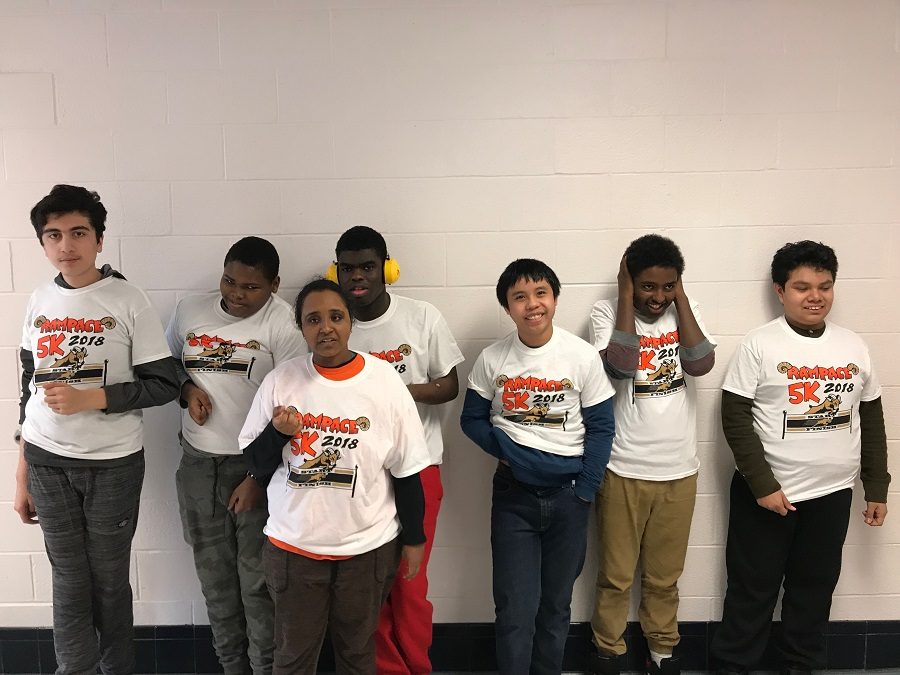Autism Program Helps Prepare Students for Future
Students from Autism program instructor Caitlin Wise’s class wear their new Rampace shirts given as a gift by the Rampage. The Rampace 5k was held Nov. 17 at the RHS track.
May 10, 2019
Educators often talk about the lasting impact of watching their students grow. In one area of RHS, teachers have the unique experience of helping students grow from ninth graders all the way into young adults (age 21).
For over 25 years, the RHS autism program has offered students with autism the opportunity to learn, grow and develop into independent individuals and help them transition into life after high school.
Autism, also known as autism spectrum disorder, is a developmental disorder that affects communication and behavior. Symptoms include, but are not limited to, having trouble with social skills, speech and nonverbal communication and repetitive behaviors, according to the National Institute of Mental Health.
The autism program at RHS consists of 15 students, seven paraeducators, three teachers and one student intern. The program helps students work on goals that contribute to their individual educational program until they graduate at the age of 21. The individual programs work on developing language, social skills and student independence. For completing work or doing good deeds, students often receive tokens that can be used to redeem prizes.
Students work together every day as they grow and progress through the program, strengthening the bonds among students and between students and teachers.
“Since many of our students are with us until they graduate at 21, we’re able to observe total growth from child to young adult. Watching these kids develop and learn is the most encouraging,” special education resource teacher Thomas Rea said.
A typical schedule for students consists of learning core classes, participation in physical education classes and completing jobs that help with functional life skills. Students also work with vocational boxes every day, which help with skills that can eventually assist the students when they get real jobs, ranging from counting money to stocking shelves, special education paraeducator Mark Stein said.
“We do reading, writing, math and daily living skills like laundry and grooming. And four days a week, we go to different job sites,” special education teacher Caitlin Wise said. “They go out to the community to CVS Pharmacy and Marriott Hotel to do different work for a few hours and to teach them vocational skills. We also go to grocery stores, Target and parks once a week to teach them skills on acting appropriately in the community and how to access the community.”
Some of the students within the program are nonverbal, meaning that they are unable to speak. To help with communication, these students use personal iPads to form sentences using icons that have been programed onto the device and have the iPad speak for them.
Although there are some communication barriers, students within the program still interact with students outside of the program every day.
“Since we’re a part of RHS, I think it’s crucial that kids are aware of students with differences in the building and in life. We come across people with different backgrounds, disabilities and learning styles. I think it’s really important that they’re included and acknowledged to make them feel like they’re a part of RHS as well,” Wise said.
Teaching independence to the students is a big aim for the program, mainly by allowing them to complete tasks on their own without adult assistance, enabling them to reach further out of their comfort zones.
The program also provides an accommodating environment for students to have fun with peers every day.
“My favorite thing is definitely the students, they’re just awesome,” Wise said. “They learn in different ways but they learn quickly and have many skills, and I think that it’s really awesome to see them grow over the course of time.”




